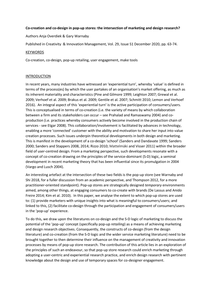Co-creation as a concept and process has been prominent in both marketing and design research over the past ten years. Referring respectively to the active collaboration of firms with their stakeholders in value creation, or to the participation of design users in the design research process, there has arguably been little common discourse between these academic disciplines. This article seeks to redress this deficiency by connecting marketing and design research together—and particularly the concepts of co-creation and co-design—to advance theory and broaden the scope of applied research into the topic. It does this by elaborating the notion of the pop-up store as temporary place of consumer/user engagement, to build common ground for theory and experimentation in terms of allowing marketers insight into what is meaningful to consumers and in terms of facilitating co-design. The article describes two case studies, which outline how this can occur and concludes by proposing principles and an agenda for future marketing/design pop-up research. This is the peer reviewed version of the following article: Overdiek A. & Warnaby G. (2020), "Co-creation and co-design in pop-up stores: the intersection of marketing and design research?", Creativity & Innovation Management, Vol. 29, Issue S1, pp. 63-74, which has been published in final form at https://doi.org/10.1111/caim.12373. This article may be used for non-commercial purposes in accordance with Wiley Terms and Conditions for Use of Self-Archived Versions. LinkedIn: https://nl.linkedin.com/in/overdiek12345
MULTIFILE
